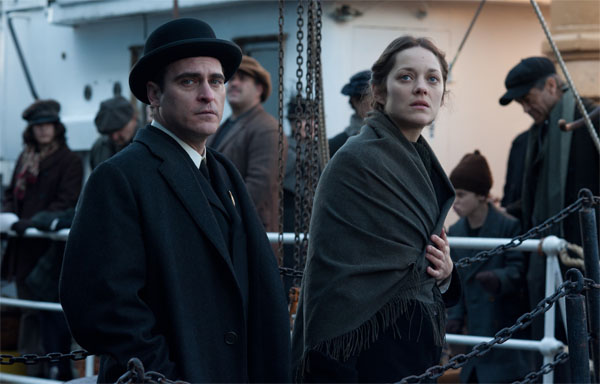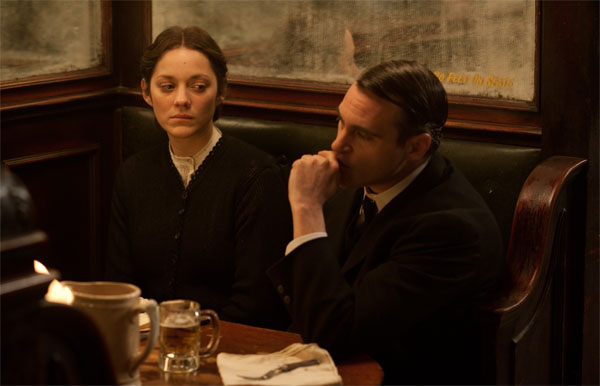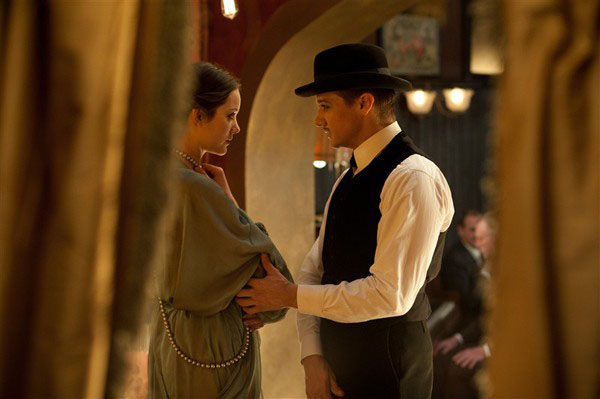“With The Immigrant, James Gray takes a considerable turn from his previous work,” begins Adam Cook, long a Gray champion, opening a dialogue with Daniel Kasman at the Notebook. “His filmography has been dominated by male characters, intricate family relations, and operatic melodrama. Here we have a female protagonist alone in America (Marion Cotillard), separated from her family, with a completely different approach to the dramatic trajectory of the film. The result gives one pause: Gray is moving towards something new.”
Danny: “The world has the same feeling—hushed, intimate, burnished by time and histories of emotion—but you are right, the focus is subtly very different, and it changes nearly everything. For one, Joaquin Phoenix who was so integral to Gray’s previous three films that the mise en scène could not be separated from his body and his intensity, is now a supporting character to Cotillard’s Polish immigrant. She gives a tremendous performance of such similar total commitment to Gray’s world of feeling that she is now inextricable from the sets, the time, the tone.”
“Moments after leaving an early morning press screening,” Indiewire‘s Eric Kohn “immediately encountered two extreme perspectives on the movie.” One “extolled the classical virtues” of the film that “reminded this man of no less than Elia Kazan’s grimy New York dramas,” while the other “called it a cheap imitation that benefited from Cotillard’s investment in her tragic role” and argued that The Immigrant “suffered equally from a melodramatic Phoenix performance and an equally preachy score. In my estimation, they’re both right. Gray’s fifth directorial effort is a conflicting experience admirable and powerfully executed in parts, cold and meandering in others.”
“Cementing himself as the great classicist of his generation, James Gray turns back the clock to 1921 in The Immigrant, a romantic tale that cuts to the very soul of the American experience,” writes Variety‘s Peter Debruge. “This rich, beautifully rendered film boasts an arrestingly soulful performance from Marion Cotillard as a Polish nurse-turned-prostitute for whom the symbolic promise of Ellis Island presents only hardship. Her travails unfold at a pace that will frustrate today’s attention-deficit audiences,” but: “Give it 20 years… and The Immigrant is sure to hold up far better than its modish competition, an ambitious yet imperfect cinematic classic with the heft and heart of great literature.”
Derek Malcolm sets it up in the Evening Standard: “Young Ewa Cybulski (Cotillard) arrives from Poland with Magda, her sick sister, only to be faced with deportation for giving a false address of family in Manhattan. Bruno (Joaquin Phoenix), a slick conman who knows who to bribe, gets the decision reversed but Ewa’s sister is sent to Ellis Island with suspected TB. Ewa links up with Bruno and works as a prostitute to send money to Magda. Orlando, a travelling magician (Jeremy Renner) who is Bruno’s cousin, falls for Ewa, and the film becomes a battle between the two men for her affection…. If the film lacks the drama and excitement of Once Upon a Time in America, it is a sincere and decently handled portrait of a time when so many believed the US to be an almost mythical land of plenty.”
Todd McCarthy in the Hollywood Reporter: “Alternately called Low Life and The Nightingale before receiving its final title, The Immigrant structurally resembles the sorts of highly dramatic women’s stories that were old Hollywood staples for actresses such as Joan Crawford and Barbara Stanwyck, in which female characters had to endure endless trials and tribulations, usually at the hands of unreliable men, before emerging stronger if not unscathed.”
At the Playlist, Jessica Kiang finds that, “while draped in Darius Khondji’s luxuriant, golden-hued cinematography like the silks of Lady Liberty’s gown, and decked in loving period costume and detail, the film is really a small-scale human drama in which those Gray staples, a love triangle and a love/hate brother-esque relationship, play out beat by minutely observed beat. Many will consider it simply too slow to invest in, and it does play out at a certain emotional remove, but it worked on us in the same way the best of the director’s previous work did: Gray’s films have always been ones that access the heart circuituously, via the mind.”
The Guardian‘s Peter Bradshaw finds The Immigrant to be “sluggish, at times entirely implausible, and trapped in its own Stygian gloom… In theory, Ewa’s unlikely encounter with the rackety world of showbusiness should inject some humour or gaiety into the movie; some energy, anyway. But the film turns out to be heading nowhere, at a leaden funeral-march pace. No one expected Gray to re-make The Night They Raided Minsky’s. But he seems to have overlaid his movie with a thick sepia of solemnity which makes the sudden outbreaks of frantic action look all the more deeply strange.”
For Screen‘s Lee Marshall, too, “in dramatic terms, we’re on the outside looking in, admiring Marion Cotillard’s full-on performance as Ewa, an innocent besmirched, while never really being engaged by a story so old-school that we half expect to see it narrated via intertitles.”
Listen to the press conference here.
Updates: “Oh James Gray… Who should I read, what should I watch, what intellectual peak should I ascend in order to understand your purported filmmaking genius?” asks David Jenkins at Little White Lies. The Immigrant “is alienatingly solemn and emotionally muddled, its central relationship rarely coming across as either convincing or sincere. The ethical quandaries faced by Cotillard lack any kind of satisfying ambiguity, as her unflagging devotion to her sister means that we never once believe that she might swerve from her stolid convictions. Dramatically, too, the machinations unfold in a series of hackneyed and contrived twists, where revelations only ever surface via handily overheard conversations, through partially opened doors and via characters shimmying up fire exits…. Either I’ve entirely missed a different, coherent and headily romantic masterwork—I’m not seeing the stupendous forest for all the withered, crooked trees—but this movie left me utterly cold.”
“The Immigrant is Classic Hollywood melodrama, done incredibly well,” writes Chuck Tryon, dispatching to Filmmaker. “The best melodramas introduce complex, often ambivalent, emotional situations, and The Immigrant brings out this complexity in powerful ways, conveying Ewa’s ambivalence about Bruno, who could, within in an instant cruelly assault her verbally and then show incredible tenderness and sympathy…. The Immigrant also speaks to our current debates about immigration reform. It’s difficult to miss the fact that today’s code words about Latino and Asian immigrants are remarkably similar to those used to describe past waves of new arrivals… [T]he film succeeds both on an emotional level and as a means of relating a significant aspect of the American experience.”
Indiewire‘s Nigel M. Smith interviews Cotillard, who learned to speak Polish for the film.
For Guy Lodge, writing at In Contention, The Immigrant is “a painstakingly restrained but profoundly romantic coming-to-America drama, and his first film set outside his own lifetime. It’s arguably his most Eurocentric work, and not just as an evocative document of the European immigrant experience… Less literally, in its most rapturous moments, The Immigrant channels the Euro-Hollywood immigrant cinema of such artists as Murnau and von Sternberg: its gauzily stylized aesthetic and literarily composed love story reaching past latter-day realism. The resulting film is altogether extraordinary: a silent tragedy with words, at once boldly breaking form while reflecting all Gray’s passions and curiosities.”
“Phoenix initially appears uncomfortable in the role, but as this indelible, impeccably-made movie goes on, it becomes apparent that he’s laying the same subtle groundwork as in his prior two collaborations with Gray, We Own the Night (2007) and Two Lovers (2008),” writes Time Out New York‘s Keith Uhlich. “Cotillard gives a true star’s performance in a role that seems informed by one of Lillian Gish‘s tortured lambs…. I often found myself second-guessing the film, questioning how, and if, it would all come together, even as all the elements casually, masterfully accumulated and coalesced, building to as pure a powerhouse of a climax as I’ve ever experienced. I won’t soon forget the storm of emotion that overcame me upon the film’s sublime final fade-out: The shock of the old made new, a miracle achieved, a great movie rising before me—like a delusion, like a dream.”
“Occasional bursts of anger notwithstanding, Phoenix is perhaps the most compassionate, even courtly scoundrel imaginable,” writes Mike D’Angelo at the AV Club. “Two Lovers suggested that Gray was developing a distinctively woozy aesthetic of his own, thereby finally getting me excited about him. Here, he’s doing a self-conscious approximation of Hollywood’s Golden Age, and the result, while reasonably compelling, feels secondhand.”
“Initial response to The Immigrant seems mixed here,” writes Salon‘s Andrew O’Hehir, “but I think it’s a magnificent drama with an immense emotional payoff, combining old-fashioned Hollywood storytelling and an auteurist, European-style sense of mystery. It doesn’t hurt that it’s built around two irresistible performances from genuine stars: As good as Phoenix was in The Master, this mendacious and tormented character may be the best role of his career.” His character, by the way, “is based on a well-known Manhattan pimp of the ’20s…. The Immigrant is less a love story than a fable of sin and redemption and perhaps even of salvation, that central American conception that touches everyone who comes here.”
Updates, 5/25: “The Immigrant is the film James Gray has been working toward his entire career,” writes Jordan Cronk at the House Next Door. It’s “his masterpiece, a classical melodrama of high ambition and fulfilled promise” as well as “a personal work of both intimate passion and grand tragedy.”
“For all its thematic heft, The Immigrant also functions as a striking cinematic collage of tinted shades and shadows,” writes Glenn Heath Jr. at Press Play. “Whether it’s the luminous shot of colorful light streaming through massive stained glass windows, or a police beat-down inside a tunnel lit entirely by flashlights, the film’s images… have a ghostly quality that directly connect with the characters’ desperate will to survive. For all its internal despair, The Immigrant never loses a sense of hope and resiliency.”
But for Barbara Scharres, writing at RogerEbert.com, “although the production design of the film is extraordinary, it doesn’t have the feeling of a very personal work. It’s the first fiction feature to actually use Ellis Island as a set, and the film’s other authentic interiors have the amber glow of gaslight. But the ethnic cohesiveness and rivalries of New York immigrant neighborhoods in the 1920s, which Gray discusses so articulately in the press notes, appear on the screen as something more homogenized and mainstream in the treatment.”
“Gray, who has spent a number of Cannes festivals trying to re-create the cinema of the ’70s,” writes EW‘s Owen Gleiberman, “here seems to be imitating a ponderously bad Hollywood period drama from 1982.”
“[I]f only Gray could bring some heat and heart to his story,” sighs Time‘s Richard Corliss. Phoenix “comports himself like a harried, tired businessman. Renner is supposed to be the charismatic showman, but brio is simply outside his skill set. That leaves the Oscar-winning French star Cotillard, who never looked more lustrous, even as her Ewa sinks into the mire. Here, as in last year’s Cannes entry Rust and Bone, she illuminates a film not quite worthy of the brilliance she poured into it. She gives a superb performance in a losing cause.
“Here is, if nothing else, a gorgeous movie to look at,” writes Brian Clark at Twitch. “And yet, while the film boasts great performances, the narrative and overall drama lacks the ferocity, momentum and intensity of Grey’s other work.”
Update, 5/27: The NYT‘s Manohla Dargis spent Friday morning, “tagging after him to write about what it’s like for a director to have a movie at Cannes.” And she notes: “You wouldn’t necessarily know it from his movies, but he’s a comedian: Kent Jones, a programmer for the Film Society of Lincoln Center, calls him one of the funniest people he knows.”
Update, 5/28: For the Voice‘s Stephanie Zacharek, The Immigrant is “yet more evidence that Gray is a director who can tease rich, subtle colors out of melodrama…. It’s as if the ghosts of an older, vanished New York have been freed from the tyranny of faded photographs and allowed, once again, to move, think, and feel.”
Update, 5/31: Indiewire‘s Nigel M. Smith has “sat down with a chatty Gray the day following the film’s premiere in Cannes to discuss the mixed reaction to the drama, what inspired him to write it with his Two Lovers collaborator Ric Menello, and whether he would ever consider taking a break from his emotionally bruising films to make a comedy.”
Update, 6/3: As noted last week, the Playlist‘s Jessica Kiang gets Gray talking at considerable length about the sci-fi project he’s working on: “NASA has made a miscalculation about one of its astronauts, who cannot handle deep space. So the idea is a kind of mental breakdown in space, and to do it almost like Apollo footage: incredibly realistic—so no sound in space, obviously—and to do it distinguishing itself with the idea that, in a way, human beings need the earth.” He’s got about 400 pages of research and a treatment, so he’s ready to spend about four weeks writing. Then, the rewrite; and he hopes to be shopping the screenplay by early fall.
Today, Kiang returns to her conversation, covering the other things they talked about, “even managing to squeeze in a little discussion of some of the issues facing contemporary U.S. cinema as a kind of a follow-on to the topics that had arisen during our last chat in December, as well a quick update on the status of a few of his gestating projects, aside from the sci-fi film.”
For Press Play, Glenn Heath Jr. talks with Gray, too, about “1930s melodramas, gender representation on screen, family dynamics, and Fellini’s La Strada.”
Cannes 2013 Index. And you can watch over 100 films that have seen their premieres in Cannes right here on Fandor. For news and tips throughout the day every day, follow @KeyframeDaily on Twitter and/or the RSS feed. Get Keyframe Daily in your inbox by signing in at fandor.com/daily.






